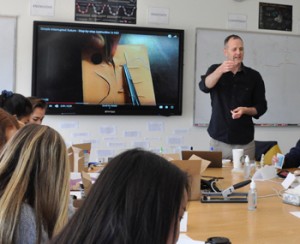 When performing surgery with limited resources, doctors have to rely on their education, centuries of surgical best practices, and an ability to improvise, Dr. David Shaye told honors biology students during an in-house field trip.
When performing surgery with limited resources, doctors have to rely on their education, centuries of surgical best practices, and an ability to improvise, Dr. David Shaye told honors biology students during an in-house field trip.
“Your education, from beginning to end, is like a collection of Legos,” said Dr. Shaye, a facial plastic and reconstructive surgeon at the Massachusetts Eye and Ear Infirmary. “You’re picking up little pieces along the way, and throughout your life, you’ll figure out ways to put them together.”
Students spent the morning in a Pritzker Science Center lab using clay to build the structure needed for a nose, and practicing stitches with suture kits. Dr. Shaye explained the complex processes involved in his work, whether the surgery is cosmetic or in response to an illness or injury, and shared several examples of his work at home and abroad.
In addition to surgery at Mass Eye and Ear, Dr. Shaye has done extensive research on global surgery—training and equipping practitioners in remote or developing areas. He has volunteered around the world, performing surgeries to fix cleft lips and palates and facial deformities, as well as life-saving reconstructions following accidents, infection, illnesses and wounds. Challenges of ineffective prior treatment, lack of electricity and modern surgical tools, and unsterilized environments compound the risks for surgery in such places.
Dr. Shaye is a U.S. Department of State Fulbright Scholar, who received his bachelor’s degree from Hamilton College and his medical degree from Albany Medical College. He completed his residency in head and neck surgery at the University of California-Davis and a fellowship in facial plastic and reconstructive surgery at the University of Minnesota. He has volunteered in Africa, Asia and the Caribbean, and works with Doctors Without Borders to provide reconstructive facial surgery for survivors of noma, an often fatal orofacial gangrene that affects people, primarily children, suffering from hunger and malnourishment, and can cause facial deformations. He participates with Operation of Hope to help children born with facial deformities, and his work has been featured in local and national media.